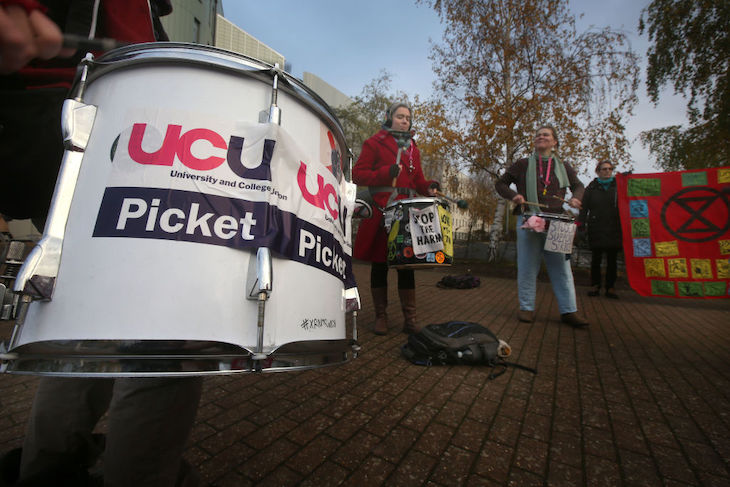University lecture halls are empty once again this morning – and students left to fend for themselves as they prepare for their summer exams. Yes, it’s another strike day on campus: the University and College Union (UCU) has announced 18 days of walkouts across February and March in a row over pay, working conditions and pensions. ‘We would not be calling this action if there was another way,’ insists the UCU. But is that really true?
As a student at the University of St Andrews, I’m set to miss dozens of hours of teaching over the next two months: 18 days without lectures, seminars and tutorials; 18 days without the recommendations of a lecturer about what to read, where to look and how to make sense of the demands of my degree.
These strikes amount to the most significant loss of contact hours in any UK-wide university strike ever. But the walkouts are not an isolated incident. Each year for the last four, the University and College Union (UCU) has organised strikes. And each year the strikes have achieved little. The impact of this, on top of the disruption caused by Covid-19 lockdowns, is immense for students. In a nation where not much seems to work right now, our universities are one of the last jewels going. Yet how long can this carry on when disruption has become not just the norm, but an expectation?
If you visit a university today, the disruption might be hard to notice at first. Without a train driver, the trains won’t run. Without a firefighter, buildings will burn down. But without a lecturer or tutor, well, universities can still largely function. In fact, students still study, research is still produced and degrees are still awarded. So although striking clearly places some pressure on universities, it is a lot less than with almost any other profession. The result is that universities have very little pressure to give in to the demands of the strikers. Instead, it’s students – forking out sky-high tuition fees – who pay the price.
This isn’t to say students like me don’t have some sympathy with those walking out: lecturers are victims of a poorly-structured university sector – one that is under increasing pressure. As a recent Committee of Public Accounts report highlights, ‘pension fund deficits…inflation and rising costs’ and a ‘continuing freeze in the cap on student fees’ place a large number of institutions in an unenviable position. Starved of funding, universities have to make hard choices about what to prioritise.
Yet despite this fall in real funding, universities are in a tough market in which they have been incentivised to compete with one another. Since 2015-16, when the government scrapped the last cap on student entry numbers, universities must fight to attract students in something of a free-for-all. Combined with a shrinking pool of government funding for the university sector, the result has been a generalised squeeze.
But this miserable situation doesn’t mean that walking out is the right response. Like many of the UK’s unions, the UCU is attempting to do a dash-and-grab job on one of the UK’s creaking public-facing (and partially privatised) institutions. Universities, incentivised by market pressures with only so much room to give, are unlikely to give the UCU what it wants though – no matter how many strikes take place. The results are grimly predictable: a continuing impasse in which the only party losing out are those students that want to make the most of their time on campus.
‘The longer the picket line, the shorter the dispute,’ the UCU says. But here’s the nub of the matter: I pay £9,250 to study at university. Yet I’m told in lazily-written statements by my student association that my representatives stand behind the strikes. Us students should see past this nonsense – the UCU should know the strikes won’t succeed, yet still it chooses to pursue a failed strategy. Such reckless selfishness cannot be defended.






Comments